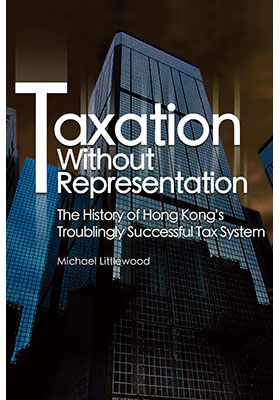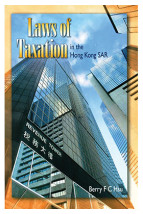Taxation Without Representation
The History of Hong Kong’s Troublingly Successful Tax System
(香港問題稅制的成功歷史)
ISBN : 978-962-209-099-6
January 2010
376 pages, 6″ x 9″
- HK$395.00
Ebooks
This book tells an instructive tale of Hong Kong’s tax system from 1940 (when taxes on income were first introduced in the territory) until the present day. For Hong Kong’s own historians and political scientists, it supplies cogent but previously neglected evidence of the influence of the territory’s business interests. For students of British imperialism, it provides a compelling case-study of relations between London and a recalcitrant colony. For Hong Kong’s own tax profession, it corrects the notion that the territory’s tax system was the product of governmental design. And for tax theorists and taxpayers everywhere, it suggests how it might be possible to structure a combination of very light taxes and very low public spending so as to win broad popular support.
“Michael Littlewood is ideally equipped to explain to the many interested readers and would-be readers why they should take a close interest in Hong Kong and its ‘troublingly successful’ tax system. Drawing on his years of experience, he takes full advantage of the availability of primary sources showing how the United Kingdom government, in the shape of Whitehall, was unable to effect major change in the Hong Kong system of taxation. The system violated many principles which conventional London theory found to be essential yet the local community were able to keep the system as it as. The reader can look forward to an excellent read as the answer to this puzzle is unravelled—partly a matter of ‘who done it?’ but, even more so, of ‘how did they get away with it?’ But the system itself is also fascinating and Dr Littlewood’s book will prove indispensable for anyone wanting to use the Hong Kong precedent to argue for a flat rate tax system in their own country.” —John Tiley, Professor of Tax Law, University of Cambridge
“Michael Littlewood’s Taxation Without Representation is a fascinating case study of a seemingly successful tax system operating in a non-democratic context. It is a first-rate history and raises troubling questions about the necessity of linking taxes and democratic choice. The book also raises intriguing doubts about whether low taxes and low services may be an acceptable alternative model to the prevalent high-tax, high-services Western welfare state. This book should be required reading for students of political science, history, sociology and law.” —Reuven Avi-Yonah, Irwin I. Kohn Professor of Law, University of Michigan
“Remarkably readable and frequently engrossing, Michael Littlewood has produced an impressive investigation of how the Hong Kong business-friendly tax system has survived so many economic and political crises. This book is more than an analysis of taxation as practised in Asia’s leading business centre. It is a fascinating study of the aims and attitudes of the ruling elite, the political and social pressures unleashed by high-speed economic growth in a colonial setting and the emergence of a commitment to low taxation and balanced budgets which the community as a whole has endorsed.” —Leo F. Goodstadt, Former Head, Hong Kong Central Policy Unit
“I recommend this important contribution to anyone interested in Hong Kong because it is foundational to understanding the political economy of this unique city . . . This book is a very good read. It is really a history of Hong Kong society and why the elites over time have created a tax system that suits them and why the majority of the people have acquiesced.” —Christine Loh, CEO, Civic Exchange





